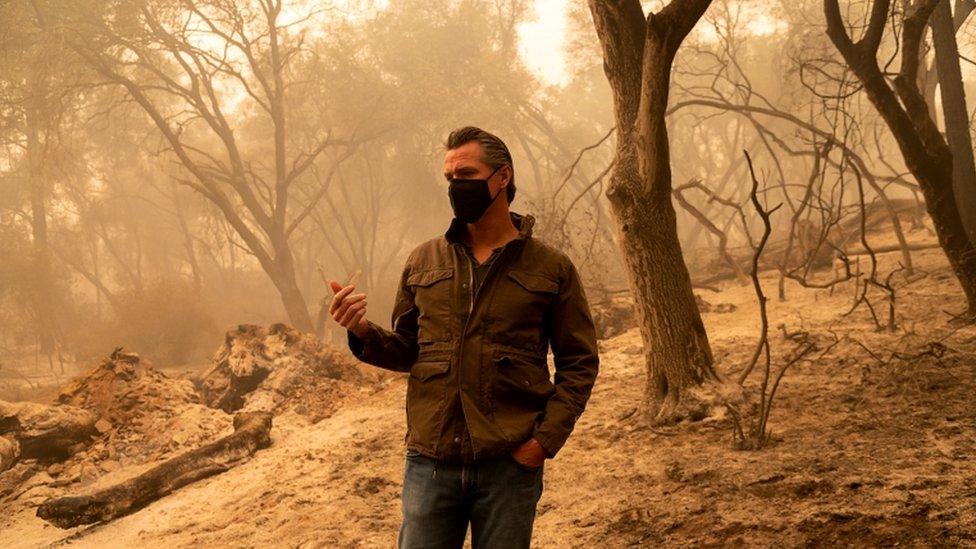US wildfires fuelled by climate change, California governor says
- Published

Mr Newsom spoke after surveying damage from one of the deadliest fire in California's history
The deadly wildfires sweeping through US West Coast states show that the debate around climate change is "over", California Governor Gavin Newsom says.
"Just come to the state of California. Observe it with your own eyes," he told reporters from a charred mountainside.
Fires have been raging in California, Oregon and Washington for three weeks.
Fanned by winds amid record heat, the blazes have burnt millions of acres, destroyed thousands of homes, and killed at least 25 people.
On Friday Oregon Governor Kate Brown said dozens were missing in her state alone.
The fires have burnt a total 4.5m acres - an area larger than Connecticut and slightly smaller than Wales - in recent weeks, according to the National Interagency Fire Center.
What did Newsom say?
The governor, a Democrat, spoke on Friday as he inspected damage from the North Complex Fire, near Oroville in Northern California.
"The debate is over, around climate change," Mr Newsom told reporters. "This is a climate damn emergency. This is real and it's happening."
He acknowledged failings in forest management in recent decades, but added: "That's one point, but it's not the point."
Highlighting the states effort to combat climate change, he said the record heat waves and unprecedented fires were the sort of problems long forecast by scientists.
President Donald Trump, a climate sceptic, has stressed poor fire-control measures as the main cause of the latest blazes.
"You've got to clean your forests - there are many, many years of leaves and broken trees and they're... so flammable," he told a rally last month.
Five ways that show the scale of California's 2020 wildfires
The North Complex Fire, which has been burning since 18 August, is among the deadliest in history. Ten bodies have been found so far and another 16 people are missing.
California has seen at least 20 deaths in total from fires since 15 August. Tens of thousands of people are under evacuation orders as 14,800 firefighters continue to combat 28 major fires in the state.

Disasters foretold

While natural factors such as strong winds have helped the spread of these massive fires, the underlying heating of the climate from human activities is making these conflagrations bigger and more explosive.
Nine of the world's 10 warmest years on record have occurred since 2005, and the UN warned this week that the five years from 2016 until this year will very likely be the hottest such period yet recorded. Both Oregon and California have warmed by more than 1C since 1900.
The sustained warmth has seen six of the 20 largest fires on record in California all occur this year. In Oregon, the spate of fires has burned nearly twice the average annual losses in just the past week.
In California, a prolonged drought over the past decade has killed millions of trees, turning them into potent fuel for the fires. Mountain regions that are normally cooler and wetter have dried out more rapidly in the summer, adding to the potential fuel load.
Climate scientists had forecast that western wildfires would grow in size, scale and impact - but their predictions are coming to fruition faster than expected.

What is happening beyond California?
In Oregon, where firefighters are battling 16 large blazes, 40,000 people are under mandatory evacuation orders.
The fires have killed four people but officials warn the death could be much higher.
Governor Kate Brown on Friday implored householders to stay out of the fire zones despite reports of looting.
"Let me assure you that we have the Oregon National Guard and Oregon State Police monitoring the situation and preventing looting," she said.
Drone footage shows homes completely wiped out by wildfires
Beatriz Gomez Bolanos, 41, told Reuters news agency of her family's frightening drive to safety through fires burning on both sides of their car. She told her four children to close their eyes as they made their escape.
"Everything is gone. We have to start again from nothing, but we are alive," she told the news agency.
At least one blaze in Oregon - the Almeda Fire, one of the most destructive in the state - is being treated as suspected arson.
The smoke pollution from the wildfires has left Oregon's largest city, Portland, with the worst air quality in the world, followed by San Francisco and Seattle, according to IQAir.com, external.
In Washington State, firefighters are tackling 15 large fires. A one-year-old boy died earlier this week as his family tried to escape a blaze. His parents remain in critical condition.




Have you been affected by the US wildfires? Share your experiences by emailing haveyoursay@bbc.co.uk, external.
Please include a contact number if you are willing to speak to a BBC journalist. You can also get in touch in the following ways:
WhatsApp: +44 7756 165803
Tweet: @BBC_HaveYourSay, external
Please read our terms & conditions and privacy policy
If you are reading this page and can't see the form you will need to visit the mobile version of the BBC website to submit your question or comment or you can email us at HaveYourSay@bbc.co.uk, external. Please include your name, age and location with any submission.
